An Important International Tax Form to Declare Foreign Financial Assets
May be filed through the IRS Streamlined Procedures

What is it Internal Revenue Form 8938?
Form 8938 is used to report specified foreign financial assets when the overall value of the those specified foreign financial assets is over the appropriate reporting thresholds. The form requires US citizens who reside within or outside of the United States and have foreign financial assets with specified values to report that information to the Internal Revenue Service (IRS).
Specified foreign financial assets may include bank accounts, stocks, securities, a swap or similar agreement with a foreign counterparty, a partnership interest, an interest in a foreign-issued insurance contract or an annuity with cash-surrender value, among others.
Form 8938 is frequently omitted from a tax return. If you missed filing Form FinCEN 114, commonly known as an FBAR for Foreign Bank Account Reporting, you may have also missed filing the Form 8938. However, for those who did not timely file a Form 8938, non-willful failure to file Form 8938 may be corrected filing through the Streamlined Procedures.
How And When to File
The deadline to report is the same as your income tax returns, generally April 15th. Form 8938 when required, must be attached to the taxpayer’s tax return for the year.
What are the Specified Values or Thresholds for Reporting?[1]
Determining when a taxpayer must file form 8938 depends on the aggregate of the taxpayer’s foreign financial assets held during the tax year. The following situations will require an individual to file[2]:
- A specified individual living in the United States filing as an unmarried individual or a specified married individual filing separately with specified foreign financial assets valued at or over $50,000 on the final day of the tax year, or over $75,000 at any point during the year.
- Specified individuals living in the United States who are married filing jointly with a total specified foreign financial assets over $100,000 on the final day of the tax year, or over $150,000 at any point during the year.
- A specified individual living outside of the United States filing as an unmarried individual or a specified married individual filing separately with total specified foreign financial assets value of assets over $200,000 on the final day of the year, or over $300,000 at any point during the year.
- Specified individuals living outside of the United States who are married filing jointly with total specified foreign financial assets over $400,000 on the final day of the tax year, or more than $600,000 at any point during the year.
What are the Differences Between Form 8938 and an FBAR (FinCEN Form 114)?
There are several!
While this is not an exhaustive list, one primary difference is the FBAR is not filed with the IRS. The FBAR is filed with the Financial Crimes Enforcement Network (FinCEN), which is a law enforcement agency within the Department of the Treasury and separate from the IRS. Another is the disclosure thresholds for Form 8938 are higher than those of the FBAR. FBARs are filed when having a foreign bank account, while Form 8938 is broader and includes having foreign financial assets. In addition, applicable penalties are different!
What are the Form 8938 Penalties?
Failure to file a complete and correct Form 8938 timely, may subject you to a penalty of $10,000. There may be an additional $10,000 penalty for each 30 days period of non-filing after receipt of the IRS Notice of Failure to Disclose, with a maximum penalty of $50,000. In some cases, certain criminal penalties may also apply. Also, underpayment of tax involving an undisclosed specified foreign financial asset, may trigger a penalty equal to 40% of that underpayment. Penalties for fraud may apply with a penalty of 75% of the underpayment due to fraud will apply.
Questions
Form 8938 can be difficult to properly prepare, compile and report. RLS LAW and its qualified attorneys are available to assist in completing the form as well as with other reporting or filing issues and delinquencies. Please call RJS LAW for a free consultation and assessment at 619-595-1655. You may also contact us via the web at www.RJSLawFirm.com. We look forward to hearing from you.
[1] Many factors are used in determining reporting thresholds and requirements and this blog does not include all reporting information. RJS Law’s qualified international tax attorneys can help assist in determining the thresholds that apply to your circumstances.
[2] These are just a few examples of situations that would require the filing of Form 8938.
Published by Andrea Cisneros Valdez, Esq. and Andrew Rice, Law Clerk

Leave a Reply